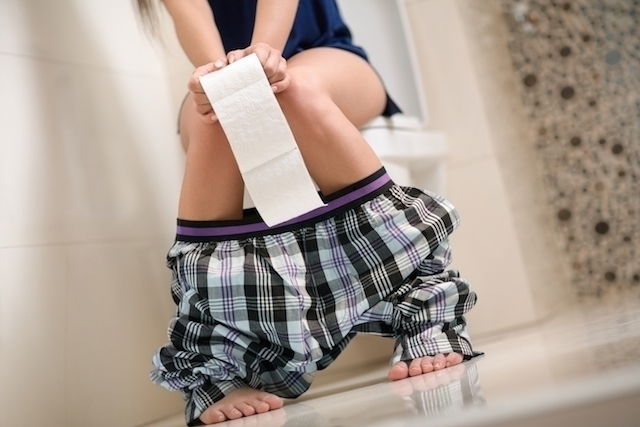Yellow stool often indicates a diet high in fat, but it can also occur due to the use of certain weight loss medications that affect bowel movements or reduce fat absorption in the intestine, which changes stool color.
In some cases, yellow stool may be a sign of health conditions such as celiac disease, intestinal infections, or problems with the pancreas, liver, or gallbladder. These conditions are usually accompanied by symptoms like abdominal pain, vomiting, fever, or loss of appetite.
If yellow stool persists, it is important to see a gastroenterologist for an evaluation. Treatment will depend on the cause and may involve dietary changes, prescription medication, or, in severe cases, surgery.

What yellow stool could mean
To help identify the possible cause of yellow stool, answer the following questions:
This tool should only be used to explore potential causes of yellow stool. It is not a substitute for a medical consultation, as only a doctor can provide a diagnosis and recommend the appropriate treatment.
Main causes
The most common causes of yellow stool include:
1. High-fat diet
Eating large amounts of fatty foods such as fried items, processed foods, or deli meats can interfere with digestion and speed up bowel movements, which can cause yellow stool.
In these cases, stool may also be more watery because it moves too quickly through the intestines. Learn more about the causes of yellow diarrhea.
What to do: reducing fatty and processed foods in the diet usually helps normalize stool color within 2 to 3 days. If the problem continues, other causes should be considered.
2. Intestinal infection
An intestinal infection, often caused by bacteria like Escherichia coli, can lead to yellow stool along with symptoms such as abdominal pain and diarrhea.
This happens because the infection inflames the intestines, preventing them from properly absorbing fat from food.
Learn more about the symptoms of an intestinal infection and what can cause one.
What to do: drink plenty of fluids and choose easy-to-digest foods such as fruits, cooked white rice, fish, and lean meats. Avoid red meat, fried foods, and processed products. Some cases of E. coli infection may require medical treatment. Check out other home remedies for intestinal infections.
3. Stress
Stress can affect appetite, often leading to unhealthy food choices, and can also interfere with digestion. This may speed up intestinal transit, preventing proper absorption of nutrients and causing diarrhea or yellow stool.
What to do: managing stress is key. This may include exercise, better time management, relaxation techniques, or, in some cases, medication prescribed by a psychiatrist if stress significantly affects daily life.
Check out these natural herbs to help soothe stress and anxiety at home.
4. Gallbladder problems
Gallbladder dysfunction, from gallbladder stones or inflammation of the biliary ducts, can lead to reduced amounts of bile reaching the intestines. Bile is a substance responsible for helping in the digestion of fats, as well as the transportation of consumed fat to the intestines. Reduced amounts of bile reaching the intestines can decrease the typical brown color of stool, making them appear more yellow.
Learn more about what causes gallstones and how they are treated. .
What to do: If you suspect you may have a gallbladder issues, see your family doctor for assessment and treatment. The doctor may order an ultrasound to inspect for any swelling, gallstones or other abnormalities. Patients with mild gallbladder symptoms may benefit from a gallbladder diet, which is typically low in fat.
5. Liver problems
Liver diseases, such as hepatitis or cirrhosis, can lead to bile accumulation in the liver. This can worsen inflammation and scarring, which reduces optimal liver functioning, feeding the cycle of bile build-up. Liver problems are typically associated with abdominal pain, and yellowing of the eyes and skin. You can learn more about the symptoms of liver disease by checking out our online symptom checker.
What to do: If you suspect your yellow stools may be related to a liver issue, you should consult a doctor or gastroenterologist for assessment and treatment.
6. Pancreatic problems
Disorders of the pancreas, such as pancreatitis, pancreatic cancer, cystic fibrosis, or duct obstruction, can cause poor digestion. This may result in yellow or pale stools that float and appear greasy or foamy.
Other symptoms include abdominal pain, dark urine, nausea, indigestion, and weight loss.
What to do: consult a doctor if these symptoms occur. Treatment may involve medication, enzyme replacement therapy, or surgery.
7. Giardiasis
Giardiasis is an intestinal infection caused by the parasite Giardia lamblia. It can cause watery, foul-smelling diarrhea with yellow stool, along with nausea, headache, dehydration, and weight loss.
Learn more about symptoms of intestinal infections.
What to do: see a doctor for stool tests to confirm the infection. Treatment is usually done with prescription antiparasitic medication.
8. Celiac disease
Celiac disease is a severe intolerance to gluten that damages the intestines when foods containing wheat, rye, or barley are consumed. This leads to poor nutrient absorption and excess fat in the stool, which can cause yellow stool.
Symptoms often improve once gluten is removed from the diet. Learn more about the signs and symptoms of a gluten intolerance.
What to do: consult a gastroenterologist for diagnosis and begin a strict gluten-free diet.
9. Use of medications
Some weight loss medications that reduce fat absorption in the intestines, such as orlistat (brand name Xenical), may cause yellow stool and increase bowel movement frequency.
Read more about what your poop color means and whether you should see your doctor.
What to do: if taking these medications, consult the prescribing doctor to discuss proper use, possible side effects, or alternatives.






























